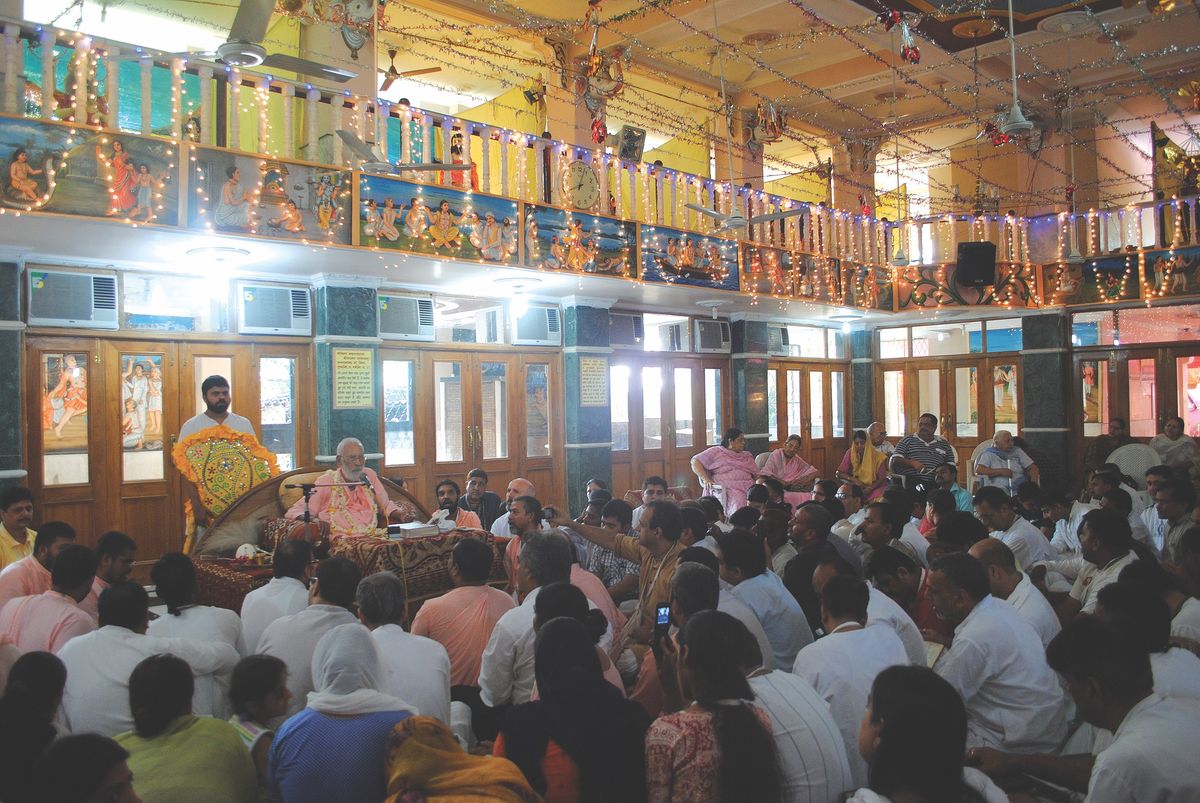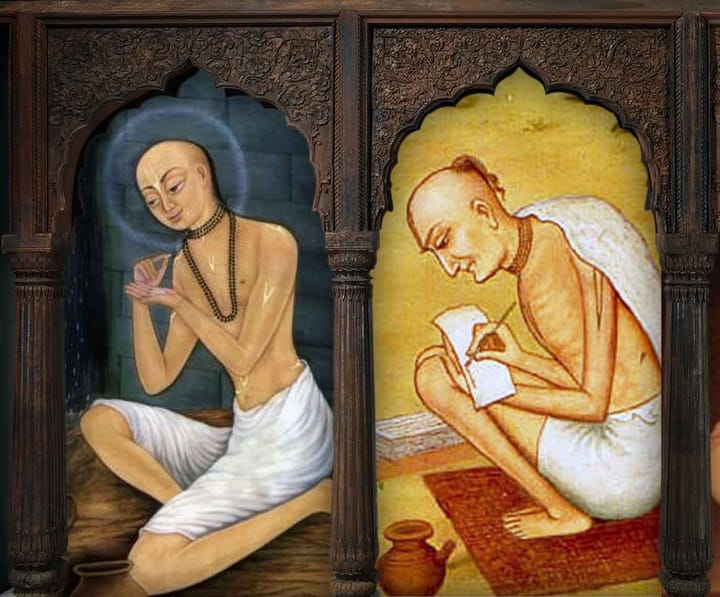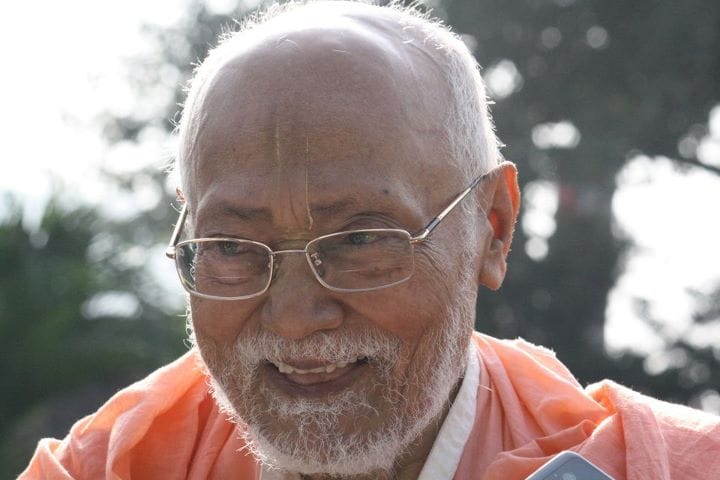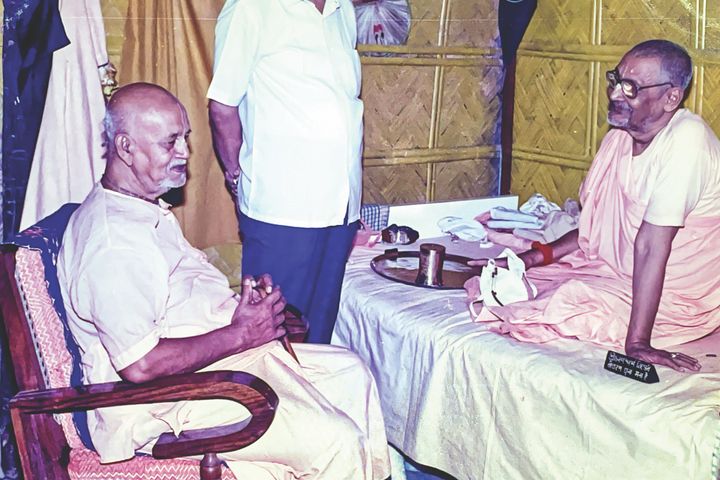Last Janmāṣṭamī Discourse

Nitya-līlā-praviṣṭa oṁ viṣṇupāda aṣṭottara-śata-śrī Śrīmad Bhaktivedānta Nārāyaṇa Gosvāmī Mahārāja’s last Janmāṣṭamī lecture on the auspicious occasion of Śrī Kṛṣṇa Janmāṣṭamī, 2 September, 2010, Śrī Ramaṇa Bihārī Gauḍīya Maṭha, Janak Purī, Delhi, 7:00 a.m. to 8:15 a.m.
Article from Rays of The Harmonist #23, 2011, First Disappearance Day
[Some days before Śrī Kṛṣṇa Janmāṣṭamī, 2010, Śrīla Gurudeva had become unwell and was staying in Delhi, the capital of India, to receive the doctors’ special attention. He desired to return to Mathurā for Janmāṣṭamī, and expressed this again and again, but the doctors specifically asked him to remain in Delhi. Complying with their request, Śrīla Gurudeva was thus in Delhi on Janmāṣṭamī day, for the first time ever. In his bhajana-kuṭira, at around 6 a.m. on Janmāṣṭamī morning, Śrīla Gurudeva expressed his deep regret. “Alas! I cannot observe the appearance festival of my abhīṣṭa-deva Śrī Kṛṣṇa, in His eternal abode of Śrī Mathurā-maṇḍala!” Having spoken thus, Śrīla Gurudeva remained stunned and silent for nearly half an hour.
Even though the most beloved devotees of Śrī Kṛṣṇa have a sphūrti of Śrī Kṛṣṇa wherever they look, thus seeing the whole world kṛṣṇamaya (literally, ‘full of Kṛṣṇa’), they possess a special affection (anurāga) for Śrī Kṛṣṇa’s dhāma, pastime places, appearance day and loving companions, absence from which precipitates an experience of transcendental separation.]
A Desire to Observe Janmāṣṭamī in Mathurā
In my childhood, my father would carry me on his shoulders to wherever the Janmāṣṭamī celebrations were performed, and at midnight he would give me a little caraṇāmṛta, pañjīrī (an ekādaśī sweet) and other prasāda. In this way, I received impressions (saṁskāra) of observing Janmāṣṭamī from my childhood.
I have been in Mathurā for fifty-six years now and in that time, I have not missed a single Janmāṣṭamī there. It is therefore a matter of great sadness that after so many years, I am very far away from Śrī Kṛṣṇa’s birthplace, even though staying in nearby Delhi. Despite my illness, my desire to go to Mathurā is strong. If my health had improved just a little bit, I would have gone to Mathurā on Janmāṣṭamī eve and celebrated Janmāṣṭamī the next morning. This was my inner desire. But our medical specialists are not permitting my desire to be fulfilled.
The Paramount Glories of Mathurā
The city of Mathurā is indeed Mathurā [beyond compare]. Indraprastha (modern day Delhi) is completely different and its glories are different. This city is no doubt prosperous in all respects, but its entire opulence cannot compare with one stone in Mathurā.
It is stated in the Pātāla-khaṇḍa of the Padma Purāṇa, “aho madhu-purī dhanyā vaikuṇṭhācca garīyasī, dinam-ekaṁnivāsena harau bhakti prajāyate – Aho! Due to Kṛṣṇa Himself appearing in Madhu-purī, or Mathurā-purī, that place has become exceedingly glorious, being even more exalted than Vaikuṇṭhā. By staying even a single night in Mathurā Nagarī, bhakti for Śrī Kṛṣṇa arises in the heart.” This is the glory of Mathurā-dhāma.
The Prime Reason for the Descent of Śrī Kṛṣṇa: the Diminution of Bhāgavata-dharma
In Bhagavad-gītā (4.7–8) Śrī Kṛṣṇa Himself states:
yadā yadā hi dharmasya
glānir bhavati bhārata
abhyutthānam adharmasya
tadātmānaṁ sṛjāmy aham
[O descendant of Bharata, whenever there is a decline of religion and an increase in irreligion, at that time I manifest My eternally perfect form in this mundane world.]
paritrāṇāya sādhūnāṁ
vināśāya ca duṣkṛtām
dharma-saṁsthāpanārthāya
sambhavāmi yuge yuge
[To protect My unalloyed devotees, to annihilate the wicked and to firmly establish religion, I appear in every age.]
Here, there are two types of dharma. One is temporary, or perishable, and the other is eternal. We can understand these verses in a simple way: If a wicked person comes here and begins to strikes us or beat us, we would suffer, but only for a certain time. It is not the nitya-dharma (eternal function) of the living entities to pray to Bhagavān and worship Him just so he will mitigate their temporary suffering. Rather, that is anitya-dharma, or a non-eternal function. Still, Śrī Kṛṣṇa removes the suffering of such followers of this perishable dharma. Nonetheless, Śrī Gītā and Śrīmad-Bhāgavatam instructs us on real dharma: “After the destruction of the body, I will not die, because I am the ātmā, spirit soul. Weapons cannot cut the soul and the wind cannot dry it, nor is it subject to old age. The soul is always youthful, free from death and eternal.”
The dharma of the eternal, imperishable soul’s service to Paramātmā is called ātmā-dharma. This is the actual meaning of the term. When this eternal function is either lost or declines, Śrī Kṛṣṇa does not wait for even a moment to advent. This is the primary reason for Kṛṣṇa’s descent.
Another Cause for the Descent of Śrī Kṛṣṇa – to Deliver Nalakūvera and Maṇigrīva from the Curse of Śrī Nārada Ṛṣi
Once, in Śrī Nārada Ṛṣi’s travels, he saw the two sons of Kuvera, Nalakūvera and Maṇigrīva, naked and playing in the water with some apsarās (heavenly damsels). Upon seeing Śrī Nārada, the apsarās were embarassed and quickly covered themselves with cloth. The two sons of Kuvera remain unclad, however, being intoxicated with pride and arrogance, and thus felt no shame. It was with the sole purpose of bestowing merciful favour upon them that Śrī Nārada desired to curse them. “Do you not have the slightest shame?” He asked them. “These ladies are covering their bodies with their cloth and facing me with folded hands in respect, but you both remain standing there shamelessly, like trees. Hence, you will become trees this very moment!”
As a result, their bodies began to slowly change into trees. Immediately they understood their mistake and prayed to Śrī Nārada Ṛṣi with folded hands, “O master! How will we be liberated?”
Śrī Nārada Ṛṣi replied that Svayam Bhagavān Śrī Kṛṣṇa would advent at the end of Dvāpara-yuga, and that they would reside in His courtyard as two yamala-ārjuna trees. When Śrī Kṛṣṇa would be bound to the mortar, He would strive to move forward between the two trees. At that time, the mortar would become stuck between them. Kṛṣṇa would then slightly tug the mortar and as a result, the trees would fall. “At that time only,” he told them, “you will both be liberated from this curse and attain śrī kṛṣṇa-bhakti and service to Śrī Kṛṣṇa in His eternal abode."
Another Cause – to Bestow a Boon on Ratnamālā, the Daughter of Śrī Bali Mahārāja
With the purpose of cheating Śrī Bali Mahārāja, Lord Śrī Vāmana-deva [the Lord in the form of a dwarf brāhmaṇa boy] took an umbrella and wearing wooden shoes, his hair matted, went alone to the assembly of Śrī Bali Mahārāja. Bali Mahārāja and all present were moved by Śrī Vāmana-deva’s presence and rose to respectfully greet Him. Bali Mahārāja offered Him obeisances and said, “O Mahārāja, we are fortunate that today You have come to our kingdom. I am sensing that You want to ask me for something.”
“I am poor,” Śrī Vāmana-deva said, “so what need do I have to fulfil? I only desire to make one small hut in which to perform bhajana. For this purpose, the measurement of a mere three of My footsteps will suffice.”
Śrī Bali Mahārāja said, “But how much land will You be able to acquire with Your three small steps? I can give You an enormous kingdom, as well as elephants, horses and a suitable maiden to marry. Why are You only begging for three footsteps?”
Śrī Vāmanadeva replied, “No, no, I am a brāhmaṇa. The dharma of the brāhmaṇa is to be satisfied in all circumstances and to be free from excessive desires. Three footsteps of land are sufficient for Me. But you must vow that you will give Me those three footsteps, regardless of the circumstances. If you recall, your forefather Śrī Prahlāda Mahārāja venerated the brāhmaṇas and never wavered once he had given his word to them. Remember this.” In this way, Śrī Vāmana-deva began to implement His plan.
Śrī Bali Mahārāja said, “If that is Your wish, so be it. I vow that I will certainly give You three footsteps of land in all circumstances.”
Just then, Śukrācārya said, “O Bali Mahārāja, by my divine vision I have understood that this brāhmaṇa is none other than Śrī Viṣṇu. He is the demigods’ spy! Beware of Him! Do not give Him even one straw; you have no idea how He can cheat you.”
Bali Mahārāja replied, “The practice in our dynasty is that once a word is spoken, it is to be honoured in all circumstances. I cannot take back what I have said.”
These days, no one keeps their word. A person may say one thing and then change his mind the very next moment, and then again the moment after that. In this manner, one’s word is always changing, according to one’s need at the time.
Śrī Bali Mahārāja took kuśa grass and a saṅkalpa-pātra (special pot with a spout, used when making a vow with water) and begin to make his vow, but no water came out of the spout. By his mystic power, Śukrācārya had entered the saṅkalpa-pātra and blocked it. Śrī Vāmana-deva observed this and told Śrī Bali Mahārāja to bring the container to Him. Śrī Vāmana-deva then took a thin stick and sharply poked it into the spout. A flow of blood poured out from the cut eye of Śukrācārya. The blockage removed, Śrī Bali Mahārāja proceeded with his vow to give Śrī Vāmana-deva three footsteps of land.
Śrī Vāmana-deva then assumed the huge form of Trivikrama, reaching into the sky. With just one footstep He covered the planets of the demigods above the earthly realm as well as all the upper planetary systems. With His second footstep He covered the Earth planet and the seven lower planetary systems. He then asked Śrī Bali Mahārāja, “Where should I put My third step?”
Śrī Bali Mahārāja contemplated this and finally said, “Prabhu, bestow Your mercy upon me by placing Your third step on my head. I am offering myself to You. Now, everything I have no longer belongs to me; it is all Yours! Now I will be as You wish me to be. However you want me to move and whatever You desire me to eat, drink or wear, I will do so.”
For this reason it is stated, “sarvasvātma-nivedane bali – Bali Mahārāja attained Bhagavān through ātma-samarpaṇa (full self-surrender)” (Padyāvali 53). Without ātma-samarpana, nothing has been done on this path.
Śrī Bali Mahārāja had a daughter named Ratnamālā. When Śrī Vāmana-deva had entered the assembly, a desire came to Ratnamālā’s heart that if she had a son like Him, she would certainly, with great affection, take Him on her lap and lovingly give Him her breast milk. Understanding her desire, Śrī Vāmana-deva gave her the boon that it would be fulfilled. But later, Ratnamālā saw how Śrī Vāmana-deva, a mere boy, cheated her father and stole everything from him. At that point she had a change of heart, and she thought that if He were her son, she would give Him poison to drink, because there is no need for a son such as this. Śrī Vāmana-deva granted this desire also.
In Śrī Kṛṣṇa’s pastimes, Śrī Bali Mahārāja’s daughter Ratnamālā came in as Pūtanā and tried to kill Kṛṣṇa by giving him poison she had smeared on her breasts. This history is explained in the Brahma-vaivarta Purāṇa, Śrī Garga-saṁhita and other scriptures.
Is this way, there are not only one or two reasons for the descent of Svayam Bhagavān, but many.
[[See previous VoD posting in which Śrīla Gurudeva explains eleven more causes for Kṛṣṇa's descent]]
Explanation of the Śrīla Bhaktivinoda Ṭhākura’s Song –‘Dekhite dekhite bhuliba vā kabe’
[Śrīla Gurudeva then instructed the devotees to sing Śrī Maṅgala-gītam from Śrī Gīta-govinda, written by Śrī Jayadeva Gosvāmī, followed by Śrī Nanda-nandana-āṣṭakam, Śrī Rādhā-kṛpā-kaṭākṣa-stava-rāja, Deva! Bhavantaṁ vande by Śrīla Rūpa Gosvāmī, as well as to sing other prayers and songs. After that, he instructed them to sing, Rādhā-kṛṣṇa prāna mora yugala-kiśora by Śrīla Narottama dāsa Ṭhākura. He then resumed his discourse.]
When Śrīla Bhaktivinoda Ṭhākura was employed in the law-courts, he worked there during the day and in the evening, at around 6 to 6:30, he took prasāda. After that he would rest. Then, at around 12:00 midnight, he would wake up and review the kīrtanas he had written. At this time, he would perform bhajana filled with bhāva, according to the instruction of Śrīla Rūpa Gosvāmī:
sevā sādhaka-rūpeṇa
siddha-rūpeṇa cātra hi
tad-bhāva-lipsunā kāryā
vraja-lokānusārataḥ
Bhakti-rasāmṛta-sindhu (1.2.295)
[One who has intense longing to attain rāgātmikā-bhakti follows in the footsteps of the Vrajavāsīs [such as Rūpa Gosvāmī] who are devoted to rāga-mārga. With his external body (sādhaka-rūpa) he should chant and hear according to the practice of rāgānuga-bhakti, and with his internally contemplated body (siddha-rūpa) he should always serve Śrī Kṛṣṇa in a spiritual form fit for his desired service following Śrī Kṛṣṇa’s beloved associates and those in their shelter.]
Absorbed in his spiritual form as a vraja-gopī, he would proceed to cook, all the while contemplating, “Rādhā, Kṛṣṇa and the gopīs are coming and I will feed them all.” In this mood, he would make pūrīs, halavā and many other delicious preparations. He recorded these moods in his songs such as Dekhite dekhite bhūlibo vā kabe. He was the recipient of the mercy of Śrīman Mahāprabhu and was His intimate associate. Following Śrīla Rūpa Gosvāmī and the six Gosvāmīs, he became famous as the seventh Gosvāmī.
[Śrīla Gurudeva then requested for this kīrtana to be sung.]
dekhite dekhite, bhuliba vā kabe,
nija-sthūla-paricaya
nayane heribo, vraja-pura-śobhā,
nitya cid-ānanda-maya (1)
vṛṣabhānu-pure, janama loibo,
jāvaṭe vivāha ha’be
vraja-gopī-bhāva, haibe svabhāva,
āna bhāva nā rahibe (2)
nija-siddha-deha, nija-siddha-nāma,
nija-rūpa sva-vasana
rādhā-kṛpā-bale, labhibo vā kabe,
kṛṣṇa-prema-prakaraṇa (3)
yāmuna-salilo- āharaṇe giyā,
bujhibo yugala-rasa
prema-mugdha ha’ye, pāgalinī-prāya,
gāibo rādhāra yaśa (4)
Here, Śrīla Bhaktivinoda Ṭhākura is saying, “He Rādhā! When will that fortunate day come that I forget all connection with my physical body? ‘I am her husband,’ ‘I am his wife,’ ‘I am their son’ – when will all these temporary relationships be forgotten and the only remaining remembrance will be, ‘I am not of this world.’ Forgetting everything else I will reach Śrī Vṛndāvana and see the splendour of Vraja with my own eyes. In that Śrī Vṛndāvana, I will take birth in Vṛṣabhānupura (Varsānā), the birthplace of Śrī Vṛṣbhānu-nandinī. Then because Śrī Vṛṣbhānu-nandinī was married in Jāvaṭa, I will also marry [into a family] there so I can always serve Her. My husband will be most arrogant, doubting me in everything I do. In this way, only the bhāva of the vraja-gopīs will remain in me and all other moods – of vātsalya, sakhya, śānta and dāsya – will forever be forgotten. Only this self-conception will remain: ‘I am a gopī and the maidservant of Rādhā-Kṛṣṇa. I am the recipient of Rūpa Mañjarī’s mercy.’ And that is all! Besides this, there will be no need for anything else!”
Nija-siddha-deha. In our performance of bhajana, by the mercy of śrī gurudeva we will attain realization of our extraordinary, beautiful siddha-deha, youthful and full of transcendental qualities, when the time is right. This siddha-deha (perfect form) will also have a perfect name as given by śrī guru.
Sva-vasana. What type of cloth will our spiritual form wear? Lalitājī’s cloth is like peacock feathers, some gopīs wear red cloth and others wear other colours. Different gopīs wear cloth of different colours. In this way, the colour of the cloth we wear will be specific to us.
Rādhā-kṛpā-bale labhibo vā kabe. When will I experience all this by the power of Śrī Rādhikā’s mercy?
Kṛṣṇa-prema prakaraṇa. What is a prakaraṇa? All the subject matters of the Bhāgavata and Jaiva-dharma are prakaraṇa: how many types of bhakti are there? What is the sequence of bhakti? What is kilakiñcita-bhāva[1]? What ishāva, bhāva, helā and so forth? In this way, all the different subjects are prakaraṇa, categories or expressions of prema. When will I understand all of these prakaraṇas?
[[ [1] Scholars describe kilakiñcita in this way: when the hero and heroine are meeting and she is feeling extreme joy, she experiences a simultaneous mixture of pride, ambition, weeping, smiling, envy, fear and anger (Utkalīkā-vallarī, 44, purport)]]
Yamuna-salilo āharaṇe giyā. When, for the service to Śrī Rādhkā, will I carry a pot to Yamunā to collect water and see her pristine waters? On the banks of this Yamunā, I will understand the loving dealings and conversations (yugala-rasa) between Rādhā and Kṛṣṇa, as well as Their prema.
Prema-mugdha ha’ye pāgalinī-prāya gāibo rādhāra yaśa. When, maddened in love, will I lose all control, seeing revelations (sphūrtis) of Śrī Rādhā-Kṛṣṇa engaging in loving pastimes wherever I look? I will thus, like a madwoman, sing the glories of Śrīmatī Rādhikā and Her divine līlā with Kṛṣṇa.
Transcendental Śrī Vṛndāvana
Do not think of Śrī Vṛndāvana as a barren, unkempt dirty village where hogs wander here and there, and that in Delhi there are such nice buildings, roads and so forth. Do not think like this! Adjust your angle of vision as of now. All of our ācāryas have came to Vṛndāvana and bowed down to it in worship. See Śrī Vṛndāvana through Śrīla Bhaktivinoda Ṭhākura’s song, “What is the splendour of transcendental Śrī Vṛndāvana like?”
[Then Śrīla Gurudeva instructed the devotees to sing Śrīla Bhaktivinoda Ṭhākura’s song, Cintāmaṇi-maya Rādhā-kuṇḍa taṭa, which describes Śrī Rādhā-kuṇḍa in transcendental Vṛndāvana, thus concluding the morning assembly.]



Comments ()